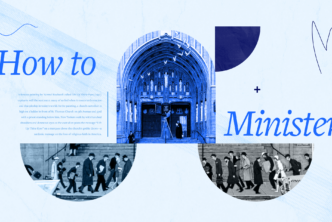By Kevin Vanhoozer
The church is the body of Christ, and its core—the community of disciples, the faith corps—enables its characteristic bodily movements: witnessing to the gospel, worshiping the God of the gospel, maintaining the health of the body, performing works of love.
To perform these movements, and to have the strength to work and keep on moving, the church needs to attend to its core. In a word, the church needs theological exercises: training in godliness.
Spiritual fitness training
I describe the pastor-theologian in various ways, but here the metaphor I want to develop is that of a spiritual fitness trainer. To make disciples is to train men and women to perform the characteristic bodily movements that enable the local church to perform its roles as an embassy of the kingdom of God, a Christ corps.
To make or train disciples fit for purpose involves certain kinds of exercise. I have in mind not simply bodily exertions for the sake of physical fitness, but all sorts of actions intended to improve a specific skill, like finger exercises for the piano, a military exercise, and exercises at the end of every textbook chapter. [One essential skill] is reading Scripture theologically in order to take every thought, and imagination, captive to Christ in order to walk the Way of Christ and become more Christlike.
Spiritual exercises
Seeing the Christian life as a series of exercises is, of course, nothing new. The most famous example is the sixteenth-century classic Spiritual Exercises by Ignatius of Loyola, a collection of prayers and meditations on what it means to live in relationship to God as a follower of Jesus.
The exercises are not bodily but interior: they are designed to strengthen not muscle but the heart, what the apostle Paul calls our “inner being” (Rom 7:22; Eph 3:16). They are recommendations for maintaining and improving the health of one’s soul: “We call Spiritual Exercises every way of preparing and disposing the soul to rid itself of all inordinate attachments, and . . . of seeking and finding the will of God in the disposition of our life.”1 The ultimate aim: to orient the heart to God, and to find God in all things.
Reality—the world we live in, the only world there is, the world created by God—always and everywhere presents everyone with a choice, an unavoidable “either-or”: “Choose this day whom you will serve” (Josh 24:15)
Discernment and decision
An important part of the exercises is learning to discern one’s own “spirit,” that is, the inner motivation for our actions. Hans Urs von Balthasar, a Roman Catholic theologian, believes that this emphasis on choice lies at the center of the Ignatian exercises: they’re all about helping persons to discern the heart of God, and the orientation of their own hearts, so that they choose God’s choice for them in joyful obedience.2
C.S. Lewis, though no Ignatian, had a similar concern for the centrality of “the choice” in the life of the disciple, as Joe Rigney explains: “Every moment of every day, you are confronted with a choice—either place God at the center of your life, or place something else there.”3
Reality—the world we live in, the only world there is, the world created by God—always and everywhere presents everyone with a choice, an unavoidable “either-or”: “Choose this day whom you will serve” (Josh 24:15), either the one true God (the Father of Jesus Christ) or some false god, be it money, sex, fame, power, or something else—their name is Legion.
Discipleship involves waking up to the realization that there is a choice, and we must stay awake to the lordship of Jesus Christ long enough to make the right one: to obey, and thereby to exercise, like Jesus, genuine freedom.4
***
Kevin J. Vanhoozer (PhD, Cambridge University) is Research Professor of Systematic Theology at Trinity Evangelical Divinity School. He is the author of several books, including Faith Speaking Understanding: Performing the Drama of Doctrine and Biblical Authority after Babel: Retrieving the Solas in the Spirit of Mere Protestant Christianity, both Christianity Today Theology Books of the Year (2015, 2017). He is married and has two daughters.
This post is excerpted from Dr. Vanhoozer’s new book, Hearers and Doers: A Pastor’s Guide to Making Disciples through Scripture and Doctrine, now available from Lexham Press. See the table of contents and preview pages. This post’s title and headings are the addition of an editor.
- Ignatius, The Spiritual Exercises of St. Ignatius, trans. Louis J. Puhl (Chicago: Loyola Press, 1968), 1.1 (1).
- Hans Urs von Balthasar, Theo-Drama, Volume 2: Dramatis Personae: Man in God, trans. Graham Harrison, vol. 2 (San Francisco: Ignatius Press, 1990), 167–68.
- Joe Rigney, Lewis on the Christian Life: Becoming Truly Human in the Presence of God (Wheaton, IL: Crossway, 2018), 29.
- It’s worth noting that Luther published his On the Freedom of a Christian at about the same time (the 1520s) as Ignatius’s Spiritual Exercises.






